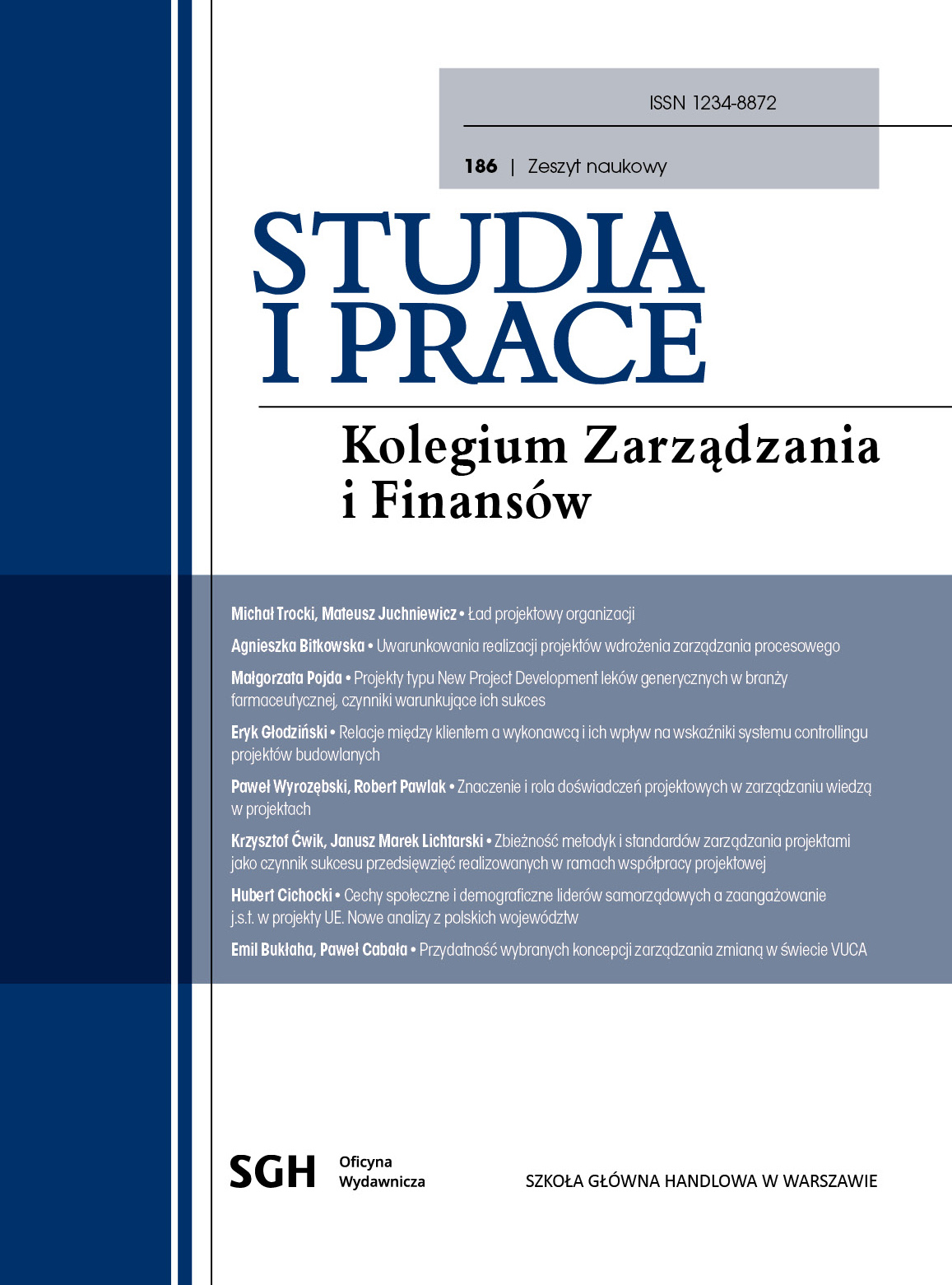The role and meaning of lessons learned in project knowledge management
DOI:
https://doi.org/10.33119/SIP.2022.186.5Keywords:
doświadczenia projektowe, organizacyjne uczenie się, wiedza w projekcieAbstract
The aim of this article is to establish the meaning and role of lessons learned in project knowledge management. The paper in question describes an empirical study devoted to lessons learned collection and application practices in organization running operations in Poland. In a result of hypothesis verification, there was a correlation established between lessons learned collection and application practices and benefits realization in projects. Moreover, it was depicted how organizational culture enhances learning lessons from conducted projects and how specific barriers and obstacles block lessons learned collection and application practices.
Downloads
References
Argyris C. [1992], On Organisational Learning, 2nd ed., Blackwell, Oxford.
Atkinson R., Crawford L., Ward S. [2006], Fundamental uncertainties in projects and the scope of project management, „International Journal of Project Management”, vol. 24(8), s. 687–698.
Brdulak J. [2005], Zarządzanie wiedzą a proces innowacji produktu, Oficyna Wydawnicza SGH, Warszawa.
Burrell K. [2019], Learning Lessons from Projects: How it works, why it goes wrong, and how you can do it better, Independently published, UK.
Czakon W. [2015], Podstawy metodologii badań w naukach o zarządzaniu, Oficyna Wolters Kluwer Business, Warszawa.
Duffield S., Whitty S.J. [2015], Developing a systemic lesson learned knowledge model for organisational learning through projects, „International Journal of Project Management”, vol. 33, s. 311–324.
Hanisch B., Lindner F., Mueller A., Wald A. [2009], Knowledge management in project environments, „Journal of Knowledge Management”, vol. 13(4), s. 148–160.
ISO [2020], ISO 21502:2020 Project, programme and portfolio management – Guidance on project management, International Organization for Standardization.
Jashapara A. [2004], Knowledge management: An integrated approach, Pearson Education Limited, Harlow, UK.
Jemielniak D., Koźmiński A.K. [2008], Zarządzanie wiedzą, Wydawnictwo Akademickie i Profesjonalne, Warszawa.
Kasvi J.J.J., Vartiainen M., Hailikari M. [2003], Managing knowledge and knowledge competencies in projects and project organizations, „International Journal of Project Management”, vol. 21, s. 571–582.
Keegan A., Turner J.R. [2001], Quantity versus quality in project-based learning practices, „Management Learning”, vol. 32, s. 77–98.
Klakegg O., Williams T., Walker D., Andersen B., Magnussen O. [2010], Early Warning Signs in Complex Projects, Newtown Square, Project Management Institute, PA.
Kotnour T. [2000], Organizational learning practices in the project management environment, „International Journal of Quality and Reliability Management”, vol. 17 (4–5), s. 393–406.
Kowalczyk A., Nogalski B [2007], Zarządzanie wiedzą: koncepcja i narzędzia, Difin, Warszawa.
Milton N. [2010], The Lessons Learned Handbook: Practical Approaches To Learning From Experience, Chandos Publishing, Oxford.
NASA [2012], In: General, N.O.o.I. (Ed.), Review of NASA’s Lessons Learned Information System, Washington, DC.
O’Dell C., Grayson C., Essaides N. [1998], If only we knew what we know: the transfer of internal knowledge and best practice, Free Press, New York.
Office of Government Commerce (OGC) [2017], Managing successful projects with PRINCE2,
th ed., The Stationery Office, London.20. Paver M., Duffield S. [2019], Project Management Lessons Learned: The elephant in the room, „Journal of Modern Project Management”, vol. 6(3), s. 105–121.
Pawlak R. [2019], Praktyczne aspekty stosowania wybranego modelu zarządzania wiedzą z doświadczeń projektowych, „E-mentor”, nr 4(81), s. 47–62.
Pawlak R. [2020], Wykorzystanie doświadczeń z realizacji projektów jako element doskonalenia procesów zarządzania wiedza w polskich organizacjach – wyniki badań, „E-mentor”, nr 3(85), s. 65–76.
Project Management Institute (PMI) [2017], A Guide to the Project Management Body of Knowledge, 6th ed., Project Management Institute, Newton Square, PA.
Reason J. [1997], Managing the Risks of Organizational Accidents, Ashgate, Aldershot, Hants, England.
Rosa D., Chaves M., Oliveira M., Pedron C. [2016], Target: A collaborative model based on social media to support the management of lessons learned in projects, „International Journal of Managing Projects in Business”, vol. 9(3).
Schindler M., Eppler M.J. [2003], Harvesting project knowledge: a review of project learning methods and success factors, „International Journal of Project Management”, vol. 21(3), s. 219–228.
Senge P. [1990], The fifth discipline, Doubleday, UK.
Sopińska A. [2008], Wiedza jako strategiczny zasób przedsiębiorstwa, Oficyna Wydawnicza SGH, Warszawa.
Spałek S. [2012], The role of project management office in multi-project environment, „International Journal of Management and Enterprise Development”, vol. 12(2), s. 172–188.
Spałek S. [2013], Dzielenie się wiedzą projektową w polskich przedsiębiorstwach. Zarys problematyki, „Journal of Management and Finance”, vol. 11(2), s. 305–315.
Sutherland J., Schwaber K. [2020], The Scrum Guide. The Definitive Guide to Scrum: The Rules of the Game, https://scrumguides.org/index.html (data pobrania: 22.10.2022).
Trocki M. [2011], Zarządzanie wiedzą w projektach, Oficyna Wydawnicza SGH, Warszawa.
Williams T. [2007], Post-Project Review to Gain Effective Lessons Learned, Project Management Institute, Newtown Square, PA.
Williams T. [2008], How do organisations learn lessons from projects – and do they? „IEEE Transactions in Engineering Management”, vol. 55(2), s. 248–266.
Wyrozębski P. [2011], Praktyki zarządzania wiedzą projektową w polskich organizacjach – wyniki badań, „E-mentor”, nr 42(5), s. 64–75.
Wyrozębski P. [2014], Zarządzanie wiedzą projektową, Difin, Warszawa









